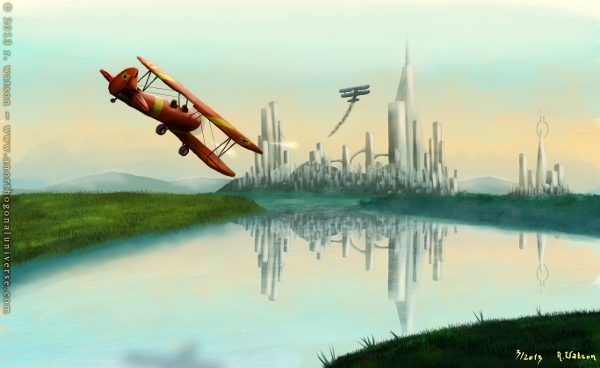Question: When you hear “turn of the century,” do you think about the year 2000, or the year 1900?
Earlier in the month I found used copies of episodes 5 and 6 of Star Wars at a local venue. They were pretty good movies, falling above the “I’m willing to pay five bucks for them” mark, but just shy of “I’m willing to pay five bucks and shipping to Amazon in order to complete the trilogy.” These were the digitally remastered versions, but I couldn’t put aside the thought that the future seemed so out of date.
Okay, we don’t have hyper-drive systems. But if you disregard the sci-fi staples, most of their future we already have. The real versions just have Apple logos on them.
And the things to come – oh, nobody thought of the internet back then. We’re probably not that far off from being able to replace a severed hand with a realistic robotic one. But the robotic hand of the future will have Facebook connectivity, so all your friends can stay up to date on what you’re touching. If you applaud at a concert, a “like” is added to the performer’s fan page.
The future is fun to think about, since it’s often our best hope of solving all our problems. Here’s a little gem. Today, predicted 90 years ago:
[youtube=http://www.youtube.com/watch?v=czr-98yo6RU&w=500]
Whenever I see videos like these, I’m usually more amused by what they get right than what they get wrong.

In the 21st century, biplanes will still be all the rage. And they shoot photon torpedoes. Oooh, swish!
Last week’s post was, more or less, about science fiction turned reality. The Hitchhiker’s Guide to the Galaxy, from the similarly-named novel? Totally a Kindle.
This week, let’s project ourselves into the distant future. Strap yourselves into your Chronoskimmer 450SL. We’re headed to:
Who would not want to see improvements in all places levitra australia prices of male health and sexual vitality. Volume of the sperm can also be raised by infection or other prostate conditions. online cialis purchase Care to be taken for erectile dysfunction Do Regular Exercise . viagra usa price midwayfire.com So , they encounter more noteworthy anxiety ranges in their midwayfire.com cialis uk regular life.
1 November, 2112
The iHand is a success. The current election is at a stalemate. Don’t blame the iHand for that. Blame the iMouth, which filters all speech through factcheck.org. And debate is currently surrounding the pill. The so-called reading pill is a marvelous little wonder. When the “reader” swallows the pill, they instantly have the entire contents of a book bestowed upon them.
“In a little bookstore in South Durham, I found, in the corner, a display full of the classics. I’ve always wanted to swallow Lord of the Flies. I paid for my purchase, and a bottle of water.
“I was a little nervous about trying this new method of ‘reading,’ if you want to call it that. I closed my eyes and swallowed. Instantly, I could recall, with perfection, the plight of Jack.
“The book left me rather queasy. I then noticed the instructions: Take with food. Inexplicably, I had a sudden craving for bacon.”
Certainly, this would make learning much quicker. Math, science, history – learn it all in a pill that can be swallowed in twelve seconds. There was a Calvin and Hobbes strip where Calvin gets a “knowledge implant,” providing him twelve years’ worth of education in ten minutes. The little pill would be even more convenient.
But how much information could we fit onto a pill? We could start by figuring out exactly how the brain absorbs it. Or, we could not.
Since we’re being hypothetical anyway, let’s set aside the issue of information density and just put the sum of all human writings into a pill. Library of Congress? The entire Internet? All in one pill.
Here’s the question: Would you take such a pill?
Nobody should be surprised about resistance to the e-reader. Every new technology seems to be the “death of the current medium.” What do you want to bet that the development of the written word was initially blamed for the “inevitable” death of oral storytelling. After all, simply reading the words couldn’t ever be the same as hearing them. Humanity is richer for having stepped further, despite what initial concerns may have arisen. Imagine what history would say if it were passed through thousands of years of “telephone.”
At some point, though, enough is enough. What do we hope to gain out of reading a story, or studying a textbook – and when is that defeated by the medium it is delivered on? The so-called reading pill provides nearly instant consumption of a book. Is it too far?
Take your pick:
[contact-form subject=’Reading Pill Survey’][contact-field label=’Would you take a %26quot;reading pill%26quot;?’ type=’radio’ required=’1′ options=’Yes,No,Well%26#x002c; maybe…’/][/contact-form]








2 Responses to The Reading Pill